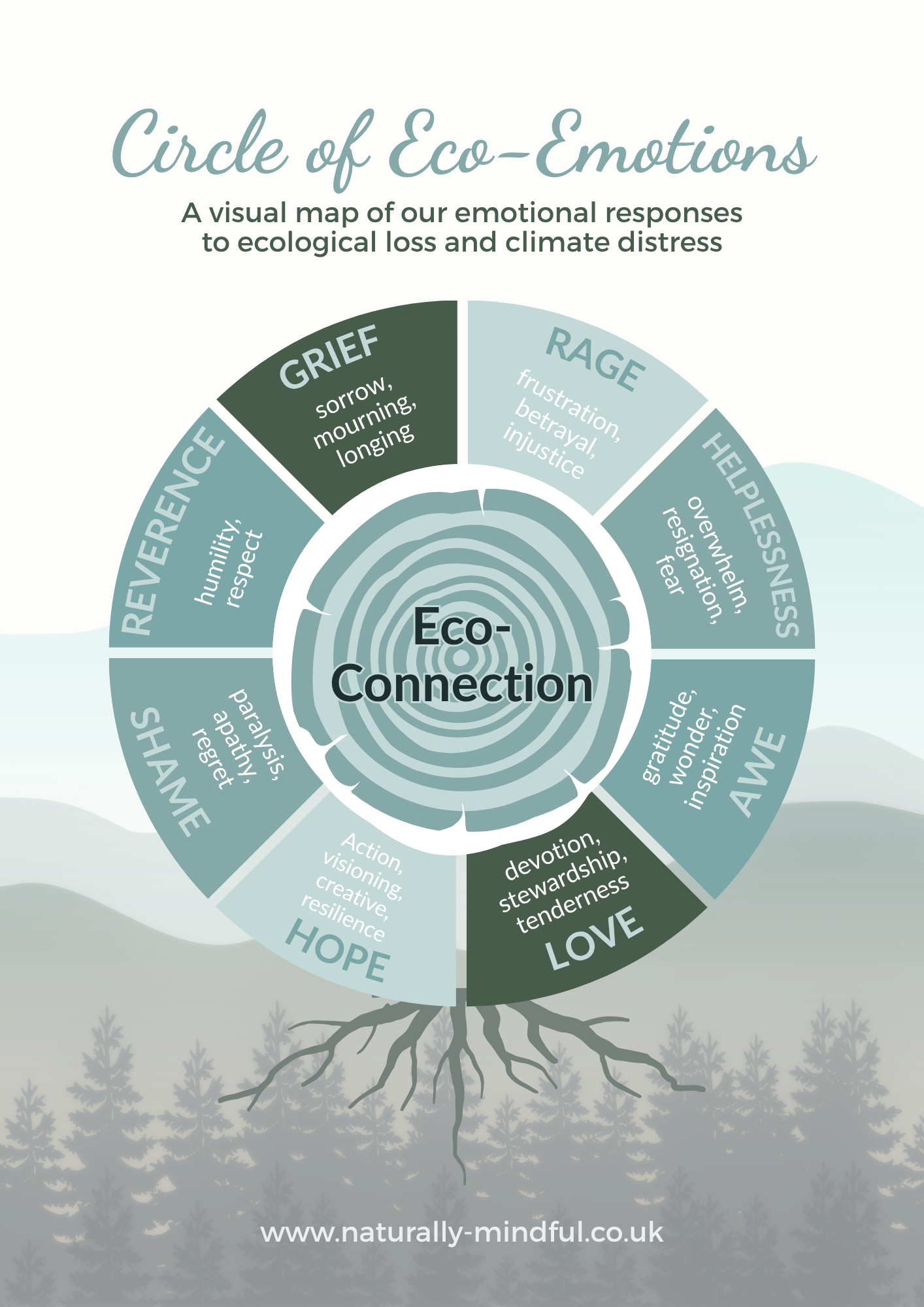Understanding Eco Grief: A Personal Reflection on Loss, Love, and Our Bond with Nature
Understanding Eco Grief: A Personal Reflection on Loss, Love, and Our Bond with Nature
What happens when your sanctuary is harmed?
This weekend, I walked into the woods just behind my home, a place I know like a friend. It’s a three-minute stroll from my front door, but a world away from the noise. My partner and I visit daily. We witness the slow turning of seasons, the flicker of light through oak leaves, the soft scuffle of deer tracks in the mud.
But Sunday felt different.
Halfway through our usual loop, I stopped. A bright, unnatural clearing caught my eye. Trees gone. Limbs jagged. Oak branches tossed aside like storm debris.
It took a moment to register: tree felling, likely by the electricity company to clear the lines.
The grief hit me like a wave.
This wasn’t just deforestation. This was personal. This was my safe place, my breath, my grounding, my recovery.
And that’s when I truly understood what so many have called eco grief.
What Is Eco Grief?
Eco grief, also known as ecological grief or climate grief, is the deep sorrow we feel in response to environmental loss. It may stem from witnessing habitat destruction, biodiversity loss, pollution, climate change, or the slow disappearance of places we love.
It’s not a disorder. It’s a natural response to losing something that matters, something we’re connected to.
According to the Climate Psychology Alliance UK, eco grief is increasingly recognised as a valid emotional experience, especially among:
Conservationists and environmental workers
Nature-based therapists and facilitators
Indigenous communities and land defenders
Everyday people who feel a profound connection with the natural world
Researchers like Albrecht (2012) coined the term "solastalgia" - the distress caused by environmental change close to home. This is not abstract fear. It’s intimate, embodied, and quietly heart-wrenching.
My Experience with Eco Grief
I didn’t expect to cry over a few trees. But this wasn’t just any place. It was my place. A daily sanctuary. A landscape that held me through burnout, anxiety, and grief.
Standing there, I felt shock, confusion, and something visceral, like witnessing violence. To someone unfamiliar with the woods, the damage might seem minor. Routine, even. But when you’ve built a relationship with land, its harm feels deeply personal.
That’s the essence of eco grief. It's rooted in relationship.
And while I understand infrastructure needs maintenance, I also believe how we do this matters. Couldn’t we tread more gently? Consult communities? Honour more-than-human life?
This experience didn’t just hurt. It deepened my commitment to the work I do—creating spaces where people can reconnect with nature and their nervous systems.
Because this isn’t just about trees. It’s about mental health.
Common Eco Grief Emotions and How They Show Up
Grief is rarely singular. Our eco-emotions are layered, messy, and deeply human. That’s why I created the Circle of Eco-Emotions - a visual map to help name and normalise what many of us feel but struggle to express.
At the centre is Eco-Connection: the bond we hold with the Earth, often wordless, spiritual, and fierce.
Radiating from this are primary eco emotions:
Grief for what’s been lost
Rage at injustice and destruction
Love for the beauty of the living world
Hope in imagining a better future
Shame for past choices or complicity
Helplessness in the face of vast, complex systems
Reverence for nature’s resilience and mystery
Surrounding these are nuanced emotions like longing, paralysis, devotion, and betrayal.
This model isn’t a fix. It’s a mirror. A reminder that our emotions are valid and wise.
Why Eco Grief Matters (and Why We Must Talk About It)
Eco grief isn’t weakness. It’s evidence of our aliveness.
But when it’s ignored, it can lead to:
Burnout, especially among environmental professionals
Apathy or emotional shutdown
Anxiety, depression, or despair
In a 2017 report by the American Psychological Association, researchers noted the growing impact of climate-related stress on mental health. Ignoring eco grief doesn’t protect us. It isolates us.
Talking about it does the opposite. It creates connection, solidarity, and collective care.
Incorporating eco-emotional awareness into therapy, education, and activism is essential. We can’t separate planetary health from personal health.
How to Honour and Navigate Eco Grief
Here are some gentle invitations if you’re feeling this grief:
1. Feel it fully
Let yourself cry, rage, or sit in silence. There is no right way to grieve.
2. Name it
Use journaling or the eco-emotions wheel to give shape to what you feel.
3. Share it
Speak with others who care. Join circles, groups, or online communities.
4. Honour the loss
Create rituals: light a candle, write a letter, plant something new.
5. Express it
Channel your feelings into art, music, movement, or writing.
6. Take small action
Engage in community-based restoration or advocacy, from a place of love, not pressure.
7. Seek support
Consider eco-therapy, somatic practices, or trauma-informed guidance.
Eco grief isn’t a problem to fix. It’s a doorway to deeper belonging.
The Role of Connection in Healing Eco Grief
We grieve what we love.
My grief for the felled trees reminded me how alive my relationship with nature really is. It’s not sentimental. It’s sacred.
Connection is both the source of our pain and the path to healing.
By tending our relationship with the land, we tend to ourselves.
Revisiting the woods this week, I noticed something small: new growth around the stump. A robin singing from the broken branch.
The hurt is still there. But so is life.
Reflection Prompt + Free Resource
"Think of a natural place that has held you through difficult times. What memories live there? How would you speak to it if it could listen?"
Give yourself time with this. Write, sketch, or simply feel.
If you'd like a tool to help you map your own eco emotions, you can download my Circle of Eco-Emotions infographic here.
It’s ideal for personal reflection, nature-based therapy, or group facilitation.
You're Not Alone in This Grief
If you’ve ever felt heartbreak for a changing climate, a lost forest, a dried-up stream—you’re not broken. You’re awake.
Eco grief is a sign of your care. And care is what the world most needs.
Let’s keep this conversation alive. Let’s create space for tenderness, truth, and collective repair.
💬 Want to share your story of eco grief or healing? Leave a comment on the blog
🌿 Download the free eco emotions infographic at www.naturally-mindful.co.uk/resources
Interested in joining a women’s circle or mindful nature walk? View upcoming events at www.naturally-mindful.co.uk/workshops
Because this grief? It matters. And so do you.


